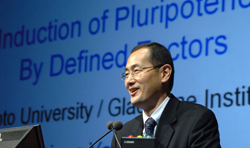Shinya Yamanaka
File:A single cardiomyocyte beating, five days after purification from cell culture.ogv
Shinya Yamanaka (Japanese: 山中 伸弥, born September 4, 1962) is a Japanese Nobel Prize-winning stem cell researcher. He is best known for his pioneering work in the development of induced pluripotent stem cells (iPSCs), which are derived from adult cells. His research has significantly impacted the fields of regenerative medicine, genetics, and biotechnology, making it possible to generate stem cells without the use of embryos and offering potential new treatments for a variety of diseases.
Biography[edit | edit source]
Shinya Yamanaka was born in Osaka, Japan, and completed his medical degree at Kobe University in 1987. He then earned his Ph.D. in pharmacology from Osaka City University in 1993. After completing his postdoctoral research at the Gladstone Institutes in San Francisco, California, he returned to Japan where he began his groundbreaking work on stem cells.
In 2006, Yamanaka and his team announced that they had successfully reprogrammed adult mouse fibroblast cells to become pluripotent stem cells, essentially turning back the clock on a cell's development to its embryonic state. This was achieved by introducing four specific genes into the adult cells. The resulting iPSCs demonstrated the ability to differentiate into any type of cell, mirroring the capabilities of embryonic stem cells but without the associated ethical concerns. In 2007, his team replicated the process with human cells, a monumental step forward in stem cell research.
Contributions to Science[edit | edit source]
Yamanaka's work has opened up new avenues for the study of disease, drug discovery, and transplantation medicine. iPSCs have the potential to revolutionize the treatment of a wide range of diseases, including Parkinson's disease, diabetes, heart disease, and various forms of cancer. By generating patient-specific iPSCs, researchers can create models of diseases, study their progression, and develop targeted therapies.
Moreover, Yamanaka's research has significantly reduced the ethical controversies surrounding stem cell research, as iPSCs do not require the use of human embryos. This has led to increased support and funding for stem cell research globally.
Awards and Honors[edit | edit source]
For his contributions to science and medicine, Shinya Yamanaka has received numerous awards and honors, including the 2012 Nobel Prize in Physiology or Medicine, which he shared with Sir John Gurdon for the discovery that mature cells can be reprogrammed to become pluripotent. He has also been awarded the Wolf Prize in Medicine, the Gairdner Foundation International Award, and the Kyoto Prize in Advanced Technology, among others.
Current Work[edit | edit source]
As of the last update, Shinya Yamanaka is a professor at Kyoto University where he continues his research on iPSCs. He also serves as the director of the Center for iPS Cell Research and Application (CiRA) at Kyoto University, a leading institution for iPSC research. His ongoing work focuses on improving the efficiency and safety of iPSC generation and differentiation, with the ultimate goal of bringing iPSC-based therapies to clinical practice.
Legacy[edit | edit source]
Shinya Yamanaka's discovery of iPSCs represents one of the most significant breakthroughs in biomedicine of the 21st century. His work not only provides a powerful tool for medical research and therapy but also addresses ethical concerns in stem cell research, making it one of the most promising and rapidly advancing areas in modern science.
Search WikiMD
Ad.Tired of being Overweight? Try W8MD's NYC physician weight loss.
Semaglutide (Ozempic / Wegovy and Tirzepatide (Mounjaro / Zepbound) available. Call 718 946 5500.
Advertise on WikiMD
|
WikiMD's Wellness Encyclopedia |
| Let Food Be Thy Medicine Medicine Thy Food - Hippocrates |
Translate this page: - East Asian
中文,
日本,
한국어,
South Asian
हिन्दी,
தமிழ்,
తెలుగు,
Urdu,
ಕನ್ನಡ,
Southeast Asian
Indonesian,
Vietnamese,
Thai,
မြန်မာဘာသာ,
বাংলা
European
español,
Deutsch,
français,
Greek,
português do Brasil,
polski,
română,
русский,
Nederlands,
norsk,
svenska,
suomi,
Italian
Middle Eastern & African
عربى,
Turkish,
Persian,
Hebrew,
Afrikaans,
isiZulu,
Kiswahili,
Other
Bulgarian,
Hungarian,
Czech,
Swedish,
മലയാളം,
मराठी,
ਪੰਜਾਬੀ,
ગુજરાતી,
Portuguese,
Ukrainian
Medical Disclaimer: WikiMD is not a substitute for professional medical advice. The information on WikiMD is provided as an information resource only, may be incorrect, outdated or misleading, and is not to be used or relied on for any diagnostic or treatment purposes. Please consult your health care provider before making any healthcare decisions or for guidance about a specific medical condition. WikiMD expressly disclaims responsibility, and shall have no liability, for any damages, loss, injury, or liability whatsoever suffered as a result of your reliance on the information contained in this site. By visiting this site you agree to the foregoing terms and conditions, which may from time to time be changed or supplemented by WikiMD. If you do not agree to the foregoing terms and conditions, you should not enter or use this site. See full disclaimer.
Credits:Most images are courtesy of Wikimedia commons, and templates, categories Wikipedia, licensed under CC BY SA or similar.
Contributors: Prab R. Tumpati, MD


